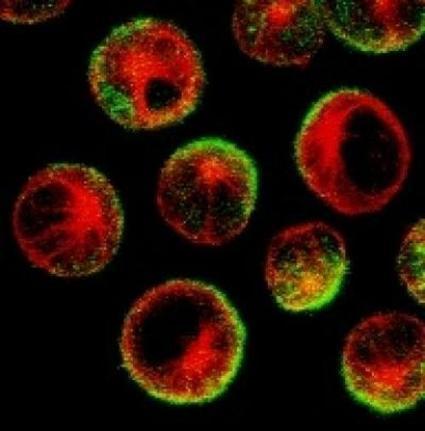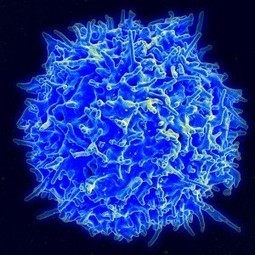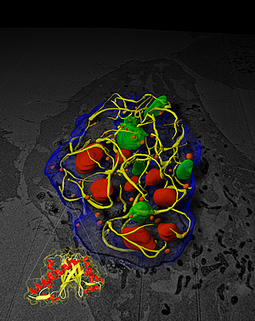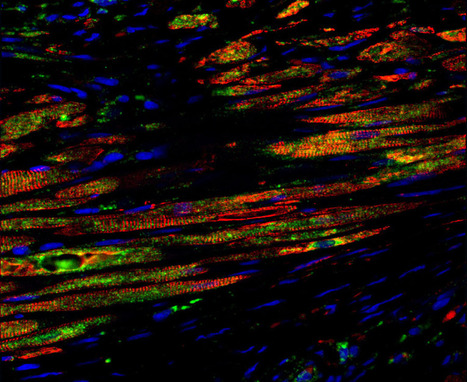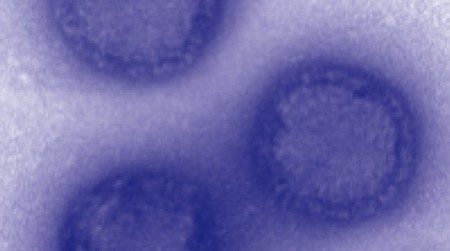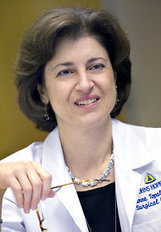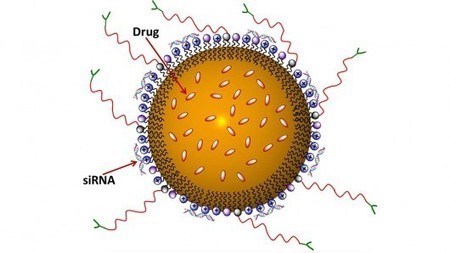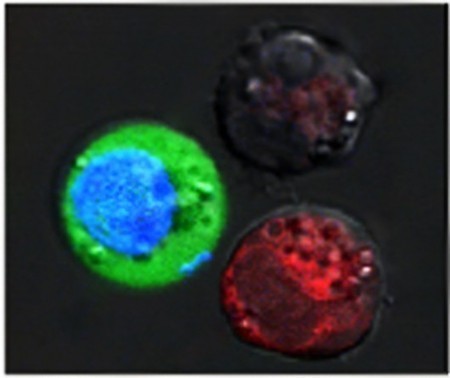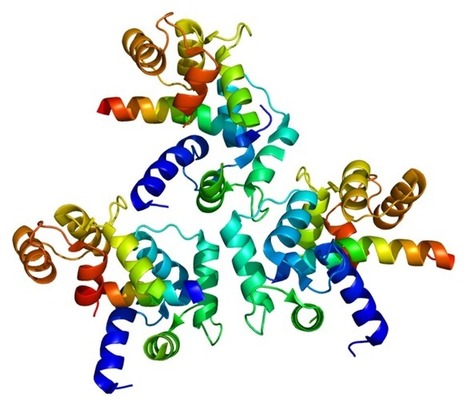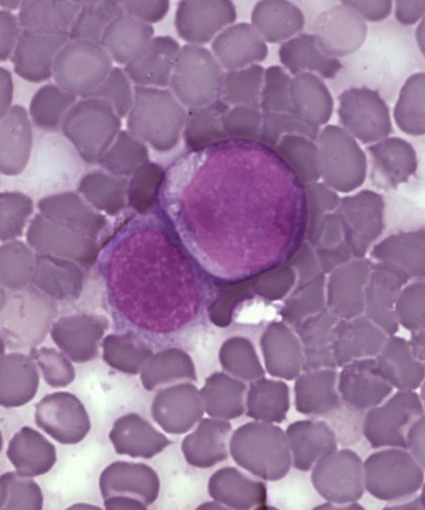 Your new post is loading...
 Your new post is loading...
The proportion of U.S. men with early, slow-growing prostate cancer who received robotic surgery and other expensive treatments increased between 2004 and 2009, according to a new study. Researchers found that use of those therapies also rose among men who were unlikely to die from prostate cancer because they were sick with other chronic diseases when their cancer was diagnosed.
Scientists from the Manchester Collaborative Center for Inflammation Research (MCCIR) have discovered why a particular cancer drug is so effective at killing cells. Their findings could be used to aid the design of future cancer treatments.
Professor Daniel Davis and his team used high quality video imaging to investigate why the drug rituximab is so effective at killing cancerous B cells. It is widely used in the treatment of B cell malignancies, such as lymphoma and leukaemia — as well as in autoimmune diseases like rheumatoid arthritis.
IBM is turning Watson loose on lung cancer, offering up a cloud-based service designed to let doctors from around the country find the best-possible treatments for their patients.
Via Alex Butler, Brian Shields
Researchers discover proteins in the IL-6 signaling pathway may be leveraged as novel biomarkers of multiple sclerosis (MS) to gauge disease activity and as a target for new therapies.
Via Brian Shields
Stem cells given in the vital period immediately after a stroke may aid recovery, suggest researchers. Rats injected with stem cells 30 minutes after a stroke had almost normal brain function restored within a fortnight. The research, published in the journal Stem Cell Research and Therapy, adds to others which have found that stem cells could aid stroke patients by boosting the body's ability to repair tissue damage.
NEW YORK (Reuters Health) - Among people with advanced cancer, poorer patients are less likely to be referred for clinical trials of experimental drugs, a new study from the UK suggests. Because those early trials will eventually help regulators decide if drugs should be approved for a wider population, it's important that test patients be representative of people the medications are designed to treat, researchers said. In addition, "There is an ethical issue of access to trials, because in general (for these patients), the standard therapeutic options have been exhausted," said James Spicer from King's College London and Guy's Hospital, who worked on the study.
The Salk findings may help scientists develop small molecules — the basis for the vast majority of current drugs — capable of destroying tumors by binding and disrupting large and complex cellular components that allow cancer cells to grow and spread. Understanding how viruses overcome healthy cells may also help scientists engineer tumor-busting viruses, which offer a new and potentially self-perpetuating cancer therapy.
Researchers at the Georgia Institute of Technology and Atlanta's Emory University have developed microneedles less than a millimeter in length that can deliver drug molecules and particles to the region in the back of eye. The new technology provides an alternative to current methods which are either invasive, with drugs being injected into the center of the eye, or based on eyedrops, which are limited in their effectiveness
KurzweilAI: Damaged and aged heart tissue of older heart failure patients was rejuvenated by stem cells modified by scientists, according to research presented at the American Heart Association’s Basic Cardiovascular Sciences 2012 Scientific Sessions. The research could one day lead to new treatments for heart failure patients, researchers said.
Although the flu virus actively keeps the immune system from detecting it for a few days, giving it time to gain a foothold, the researchers have found that a powerful synthetic protein, known as EP67, can kick start the immune system so that it reacts almost immediately to all strains of the virus. Previously, EP67 had primarily been used to help activate the immune response by being added to a vaccine. But Joy Phillips, Ph.D from San Diego State University and her colleague Sam Sanderson Ph.D. from the University of Nebraska Medical Center, saw potential for the protein to work on its own.
Great Post by Sally Church reviewing the current data from ASCO on Combating resistance to therapies in the treatment of Lung Cancer
Via Brian Shields
(Reuters) - Taking a week off from nearly all mental and physical activity - including television, talking on the phone and visiting with friends - was linked with improved mental performance and fewer...
One of the great frustrations for researchers in the war on cancer is that the body’s own defense system does not do a better job fighting the disease. Tumors, it turns out, have a molecular shield that repels attacks from the immune system. Now, a new study says, an experimental drug is showing promise in disabling that shield...
|
According to American Cancer Society estimates, lung cancer will account for 27 percent of all US cancer deaths in 2013, making it by far the leading cause of cancer death among both men and women. Part of the problem is getting the toxic chemotherapeutic drugs used to treat the cancer into the lungs. A new drug delivery system aims to overcome this problem by allowing the drugs to be inhaled, thereby delivering the drug where it is needed while reducing the harmful effects to other organs.
The first known method to permanently bypass the blood-brain barrier*, using mucosa, or the lining of the nose, has been demonstrated by researchers in the department of Otology and Laryngology at the Massachusetts Eye and Ear/Harvard Medical School and the Biomedical Engineering Department of Boston University.
The method opens the door to new treatment options for those with neurodegenerative and CNS disease.
One of the biggest problems in treating HIV patients is the amount of daily individual medications it takes to keep the virus at bay. In a new study, scientists at the Stanford University School of Medicine have engineered a new approach to tailored gene therapy that they say makes key cells of the immune system resistant to attack from the HIV virus, which may eventually lead to the removal of life-long dependencies on drugs for patients living with HIV.
The first trial comparing a new dual-hormone “artificial pancreas” with conventional diabetes treatment using an insulin pump has been completed by researchers at IRCM (Institut de Recherches Cliniques) of Montreal, led by endocrinologist Dr. Rémi Rabasa-Lhoret. It showed improved glucose levels and lower risks of hypoglycemia.
U.S. scientists are developing a technique that will target and kill cancer cells while simultaneously treating others in the same sample. Centered on fine-tuning the use of cancer destroying nanobubbles, the research holds promise for treating cancer patients in a way that’s far more targeted than chemotherapy.
Northwestern University scientists have developed a new family of compounds that could slow the progression of Parkinson’s disease. Parkinson’s, the second most common neurodegenerative disease, is caused by the death of dopamine neurons, resulting in tremors, rigidity and difficulty moving. Current treatments target the symptoms but do not slow the progression of the disease. The compounds work by blocking calcium. The compounds target and shut a relatively rare membrane protein that allows calcium to flood into dopamine neurons.
Scientists have announced a new method of treating and preventing type II diabetes. The new treatment focuses on VEGF-B, a protein within the body that affects how fat is transported and stored. Using an antibody/drug known as 2H10, the scientists were able to block the signaling of VEGF-B in mice and rats, which subsequently kept fat from accumulating in the “wrong” areas of the animals – namely their muscles, blood vessels and hearts. The paper for this researched was published in Nature on Sept 26: http://www.nature.com/nature/journal/vaop/ncurrent/full/nature11464.html
Researchers have discovered a chemical that makes cells in the retinas of blind mice sensitive to light, temporarily restoring some vision. They are working on an improved compound that they hope could one day be used to restore sight in human patients suffering from retinitis pigmentosa, the most common form of inherited blindness, and macular degeneration, the most common cause of acquired blindness in the developed world.
A Harvard researcher studying the evolution of drug resistance in cancer says that, in a few decades, “many, many cancers could be manageable.” “Many people are dying needlessly of cancer, and this research may offer a new strategy in that battle,” said Martin Nowak, a professor of mathematics and of biology and director of the Program for Evolutionary Dynamics. “One hundred years ago, many people died of bacterial infections. Now, we have treatment for such infections — those people don’t have to die. I believe we are approaching a similar point with cancer.”
Medical researchers expect that with whole genome sequencing, treatment will be tailored to an individual tumor’s mutations, with drugs, eventually, that hit several key aberrant genes at once. What is important, the researchers say, is the genes that drive a cancer, not the tissue or organ — liver or brain, bone marrow, blood or colon — where the cancer originates.
Reuters) - The number of Americans living with cancer will increase by nearly a third to almost 18 million by 2022, according to a report released on Thursday by the American Cancer Society.
In a modern-day clinical trial of a medicine belonging to one of the world's oldest classes of drugs, researchers have found that a drug related to aspirin and salicylate, which was first used by ancient Egyptians and Greeks to ease pain caused by inflammation, also has glucose-lowering properties and may be a potential treatment for people with type 2 diabetes, according to results presented at the American Diabetes Association's 72nd Scientific Sessions(R).
|



 Your new post is loading...
Your new post is loading...


